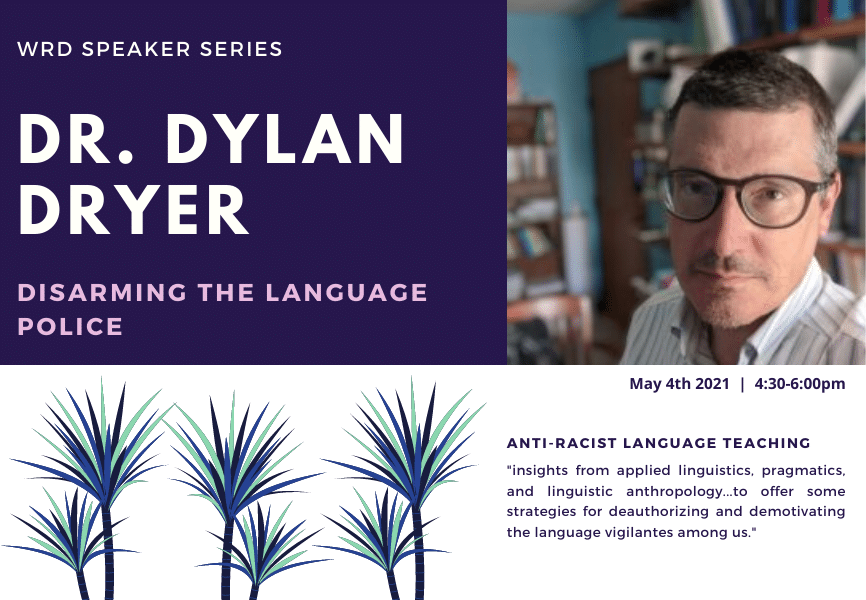This spring quarter, the WRD Speaker Series will host Dylan Dryer, Professor of Composition Studies for a talk titled “Disarming the Language Police.” The talk is part of the department’s Writing & Rhetoric Across Boarders series.
Dryer is an Associate Professor of Composition Studies at the University, where he coordinates the Graduate Program of English. He got his PhD in Composition and Rhetoric in the Midwest from UW-Milwaukee, and he considers his home base to be in Rhetorical Genre Studies. He defines Rhetorical Genre Studies as a “ theoretical framework to investigate the ways in which recurrent textual forms reflect and sustain larger social structures through ‘uptake’ — the exceptionally complex historically, culturally, cognitively and linguistically shaped moments of reader/writer/genre interface. “ Across all his work, however, he recognizes the intersections of several fields, including rhetorical genre studies, corpus analytics, writing pedagogy and program administration, cognition, writing assessment and teacher-training.
He has contributed to projects receiving the Braddock Award, the Bruffee Award, and the CCCC Technical & Scientific Communication Award: Best Article on Pedagogy or Curriculum. He is currently working on a book project, tentatively titled After Solipsism, under contract with Utah State University Press. Continuing-education in research methods remains a priority in teaching and in service to CCCC and CWPA.
He describes the May 4th talk as engaging the phenomenon of prescriptivism, and he defines prescriptivism as efforts by institutionally or self-appointed guardians of English to constrain, discourage, or repair usages deemed broken, unseemly, or in violation of (putative) rules of English. He identifies an “unusual ferocity” aroused by such usages among prescriptivists, which will be further discussed in his talk as their willingness to refer, with odd strenuousness, to disgust, shame, horror, and violence in objecting to this or that word, accent or turn of phrase. He argues that such ferocity belies a lack of meaningful consensus over which rules, if any, such usages could be said to break (and indeed whether a language could even be said to be “breakable” at all).
Contemporary investigations into prescriptivist tendencies reveal their deep influence on perceptions of ability, authority, and trustworthiness as well as how such tendencies have infiltrated widely used word-processing programs. In light of calls for linguistic justice and antiracist language teaching and assessment, we can understand the need to counter such influences as critical. Yet investigations, seemingly, have struggled to advance beyond a lackluster conclusion that the urge to monitor and correct others’ languaging practices is both universal and perennial.
The talk will open discussions that address weather or not construing language policing as natural leaves us with no strategies for engaging nonlinguists’ historically vitriolic responses to language variation. Or, the conversation surrounding ways it normalizes this behavior while missing opportunities to find productive outlets for student curiosity about language and language difference.
Dryer draws together insights from applied linguistics, pragmatics, and linguistic anthropology to hypothesize the cultural mechanism that transforms this curiosity into vitriol and to offer some strategies for deauthorizing and demotivating the language vigilantes among us.
Interested in attending? Secure your ticket at our Eventbrite page.
